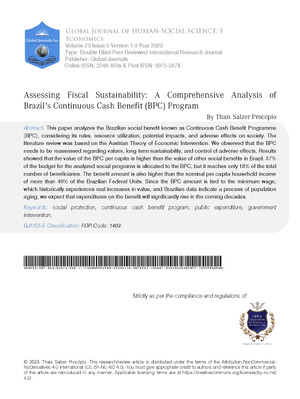Assessing Fiscal Sustainability A Comprehensive Analysis of Brazils Continuous Cash Benefit BPC Program
Keywords:
social protection, continuous cash benefit program, public expenditure, government intervention
Abstract
This paper analyzes the Brazilian social benefit known as Continuous Cash Benefit Programme BPC considering its rules resource utilization potential impacts and adverse effects on society The literature review was based on the Austrian Theory of Economic Intervention We observed that the BPC needs to be reassessed regarding values long-term sustainability and control of adverse effects Results showed that the value of the BPC per capita is higher than the value of other social benefits in Brazil 37 of the budget for the analyzed social programs is allocated to the BPC but it reaches only 18 of the total number of beneficiaries The benefit amount is also higher than the nominal per capita household income of more than 40 of the Brazilian Federal Units Since the BPC amount is tied to the minimum wage which historically experiences real increases in value and Brazilian data indicate a process of population aging we expect that expenditures on the benefit will significantly rise in the coming decades Additionally we have observed that the BPC creates an adverse incentive for a portion of the population not to contribute to the country s social security system as they anticipate fitting into the BPC s rules upon retirement For the sake of public expenditure efficiency and fiscal sustainability the value and rules of the BPC should be reviewed
Downloads
- Article PDF
- TEI XML Kaleidoscope (download in zip)* (Beta by AI)
- Lens* NISO JATS XML (Beta by AI)
- HTML Kaleidoscope* (Beta by AI)
- DBK XML Kaleidoscope (download in zip)* (Beta by AI)
- LaTeX pdf Kaleidoscope* (Beta by AI)
- EPUB Kaleidoscope* (Beta by AI)
- MD Kaleidoscope* (Beta by AI)
- FO Kaleidoscope* (Beta by AI)
- BIB Kaleidoscope* (Beta by AI)
- LaTeX Kaleidoscope* (Beta by AI)
How to Cite
References

Published
2024-01-23
Issue
Section
License
Copyright (c) 2023 Authors and Global Journals Private Limited

This work is licensed under a Creative Commons Attribution 4.0 International License.